Evaluation of Proposed Taxes in the UK Aviation Industry
VerifiedAdded on 2022/12/29
|8
|1349
|44
Report
AI Summary
This report examines proposed tax structures for the UK aviation industry, focusing on microeconomic principles. It analyzes the existing tax scenario, which involves various charges collected from passengers, and proposes a new structure that segregates costs into social and environmental taxes, fuel charges, and other fees. The proposed tax structure suggests separating social charges, fuel taxes, and other charges, and implementing a rebate policy for frequent flyers. The report evaluates the potential benefits of these proposals, including increased revenue, ethical working environments, and passenger savings. It also evaluates the impact of carbon emissions and climate change. The analysis concludes that the proposed tax can promote social and environmental development. The study also references the impact of Covid-19 and discusses the need for ethical practices within the aviation industry to mitigate environmental damage and promote passenger-friendly policies.
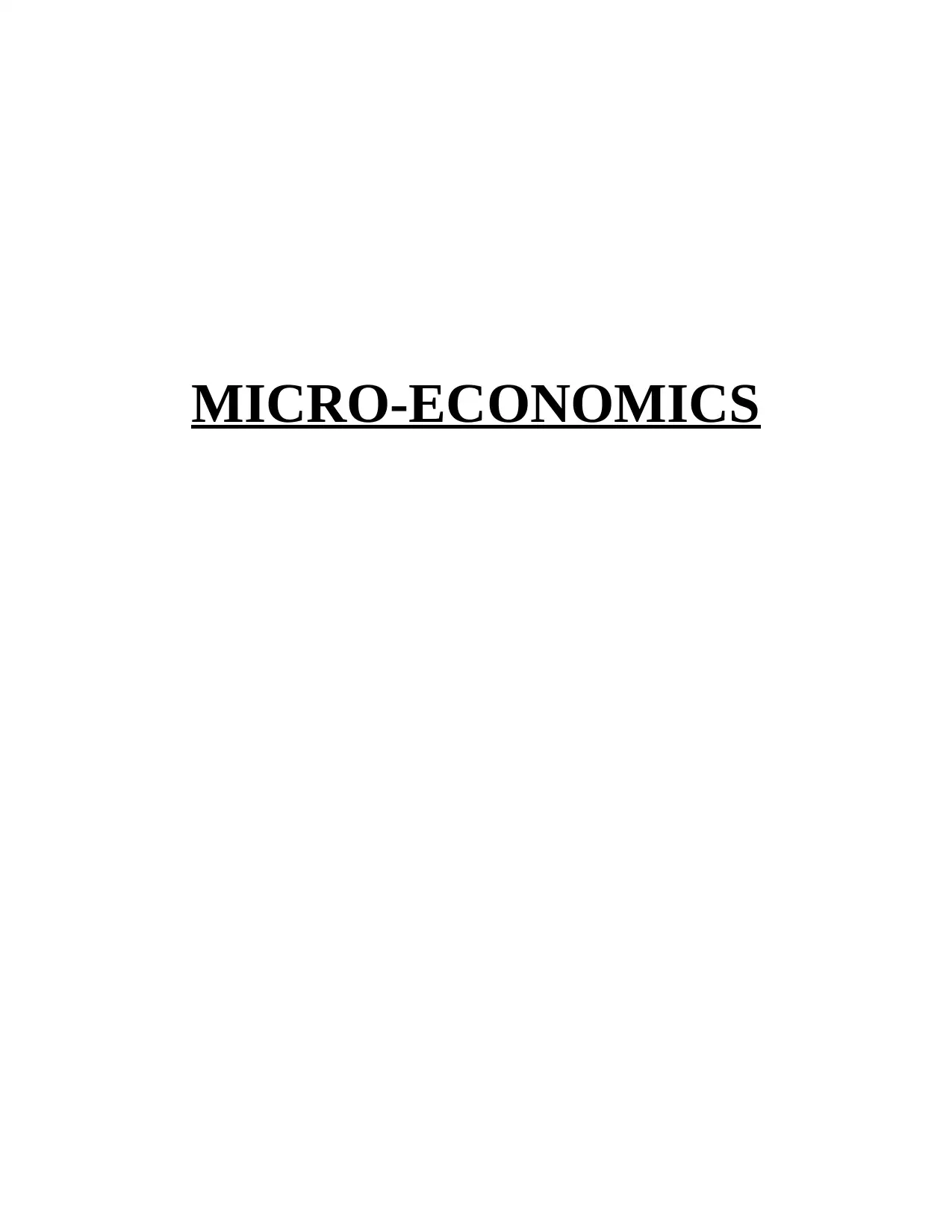
MICRO-ECONOMICS
Paraphrase This Document
Need a fresh take? Get an instant paraphrase of this document with our AI Paraphraser
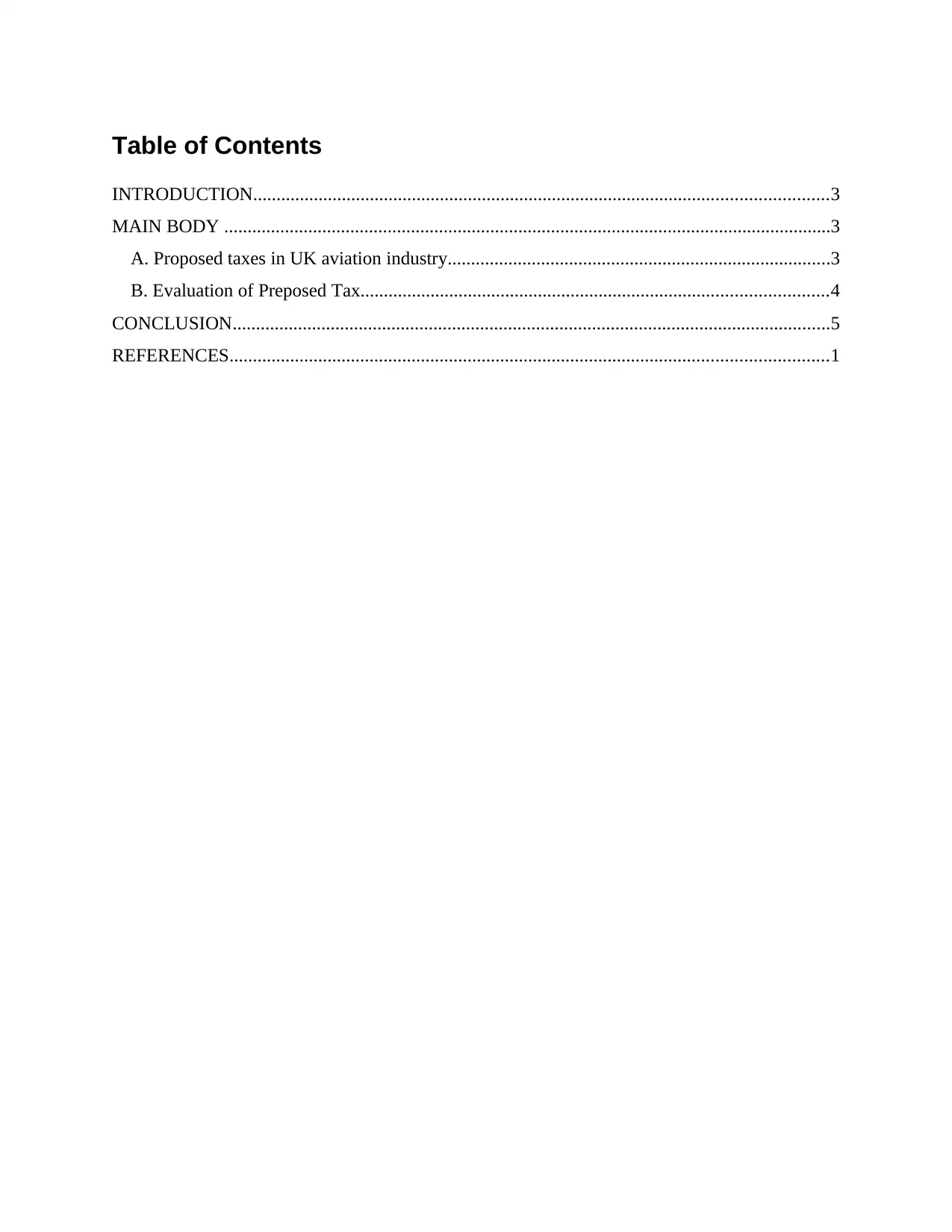
Table of Contents
INTRODUCTION...........................................................................................................................3
MAIN BODY ..................................................................................................................................3
A. Proposed taxes in UK aviation industry..................................................................................3
B. Evaluation of Preposed Tax....................................................................................................4
CONCLUSION................................................................................................................................5
REFERENCES................................................................................................................................1
INTRODUCTION...........................................................................................................................3
MAIN BODY ..................................................................................................................................3
A. Proposed taxes in UK aviation industry..................................................................................3
B. Evaluation of Preposed Tax....................................................................................................4
CONCLUSION................................................................................................................................5
REFERENCES................................................................................................................................1
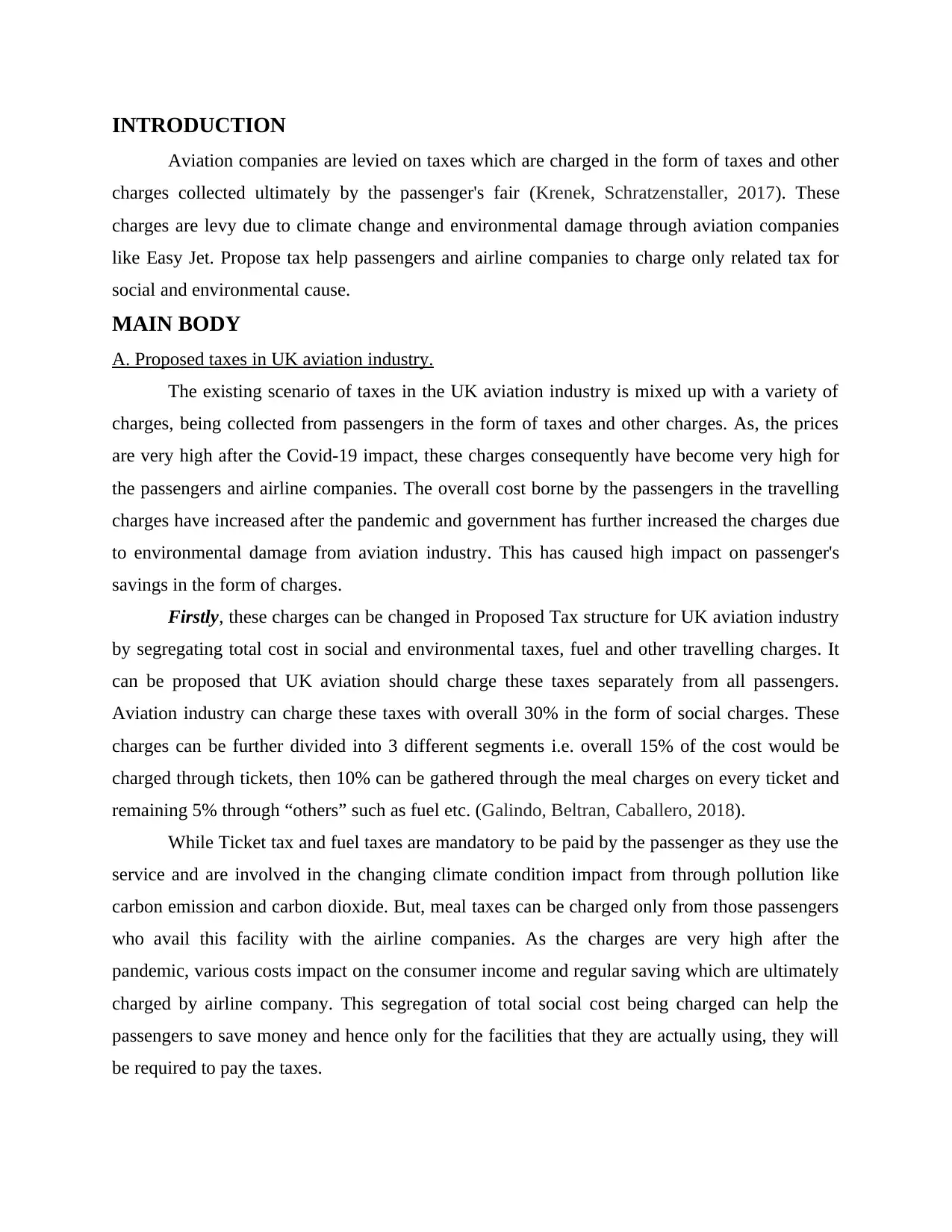
INTRODUCTION
Aviation companies are levied on taxes which are charged in the form of taxes and other
charges collected ultimately by the passenger's fair (Krenek, Schratzenstaller, 2017). These
charges are levy due to climate change and environmental damage through aviation companies
like Easy Jet. Propose tax help passengers and airline companies to charge only related tax for
social and environmental cause.
MAIN BODY
A. Proposed taxes in UK aviation industry.
The existing scenario of taxes in the UK aviation industry is mixed up with a variety of
charges, being collected from passengers in the form of taxes and other charges. As, the prices
are very high after the Covid-19 impact, these charges consequently have become very high for
the passengers and airline companies. The overall cost borne by the passengers in the travelling
charges have increased after the pandemic and government has further increased the charges due
to environmental damage from aviation industry. This has caused high impact on passenger's
savings in the form of charges.
Firstly, these charges can be changed in Proposed Tax structure for UK aviation industry
by segregating total cost in social and environmental taxes, fuel and other travelling charges. It
can be proposed that UK aviation should charge these taxes separately from all passengers.
Aviation industry can charge these taxes with overall 30% in the form of social charges. These
charges can be further divided into 3 different segments i.e. overall 15% of the cost would be
charged through tickets, then 10% can be gathered through the meal charges on every ticket and
remaining 5% through “others” such as fuel etc. (Galindo, Beltran, Caballero, 2018).
While Ticket tax and fuel taxes are mandatory to be paid by the passenger as they use the
service and are involved in the changing climate condition impact from through pollution like
carbon emission and carbon dioxide. But, meal taxes can be charged only from those passengers
who avail this facility with the airline companies. As the charges are very high after the
pandemic, various costs impact on the consumer income and regular saving which are ultimately
charged by airline company. This segregation of total social cost being charged can help the
passengers to save money and hence only for the facilities that they are actually using, they will
be required to pay the taxes.
Aviation companies are levied on taxes which are charged in the form of taxes and other
charges collected ultimately by the passenger's fair (Krenek, Schratzenstaller, 2017). These
charges are levy due to climate change and environmental damage through aviation companies
like Easy Jet. Propose tax help passengers and airline companies to charge only related tax for
social and environmental cause.
MAIN BODY
A. Proposed taxes in UK aviation industry.
The existing scenario of taxes in the UK aviation industry is mixed up with a variety of
charges, being collected from passengers in the form of taxes and other charges. As, the prices
are very high after the Covid-19 impact, these charges consequently have become very high for
the passengers and airline companies. The overall cost borne by the passengers in the travelling
charges have increased after the pandemic and government has further increased the charges due
to environmental damage from aviation industry. This has caused high impact on passenger's
savings in the form of charges.
Firstly, these charges can be changed in Proposed Tax structure for UK aviation industry
by segregating total cost in social and environmental taxes, fuel and other travelling charges. It
can be proposed that UK aviation should charge these taxes separately from all passengers.
Aviation industry can charge these taxes with overall 30% in the form of social charges. These
charges can be further divided into 3 different segments i.e. overall 15% of the cost would be
charged through tickets, then 10% can be gathered through the meal charges on every ticket and
remaining 5% through “others” such as fuel etc. (Galindo, Beltran, Caballero, 2018).
While Ticket tax and fuel taxes are mandatory to be paid by the passenger as they use the
service and are involved in the changing climate condition impact from through pollution like
carbon emission and carbon dioxide. But, meal taxes can be charged only from those passengers
who avail this facility with the airline companies. As the charges are very high after the
pandemic, various costs impact on the consumer income and regular saving which are ultimately
charged by airline company. This segregation of total social cost being charged can help the
passengers to save money and hence only for the facilities that they are actually using, they will
be required to pay the taxes.
⊘ This is a preview!⊘
Do you want full access?
Subscribe today to unlock all pages.

Trusted by 1+ million students worldwide
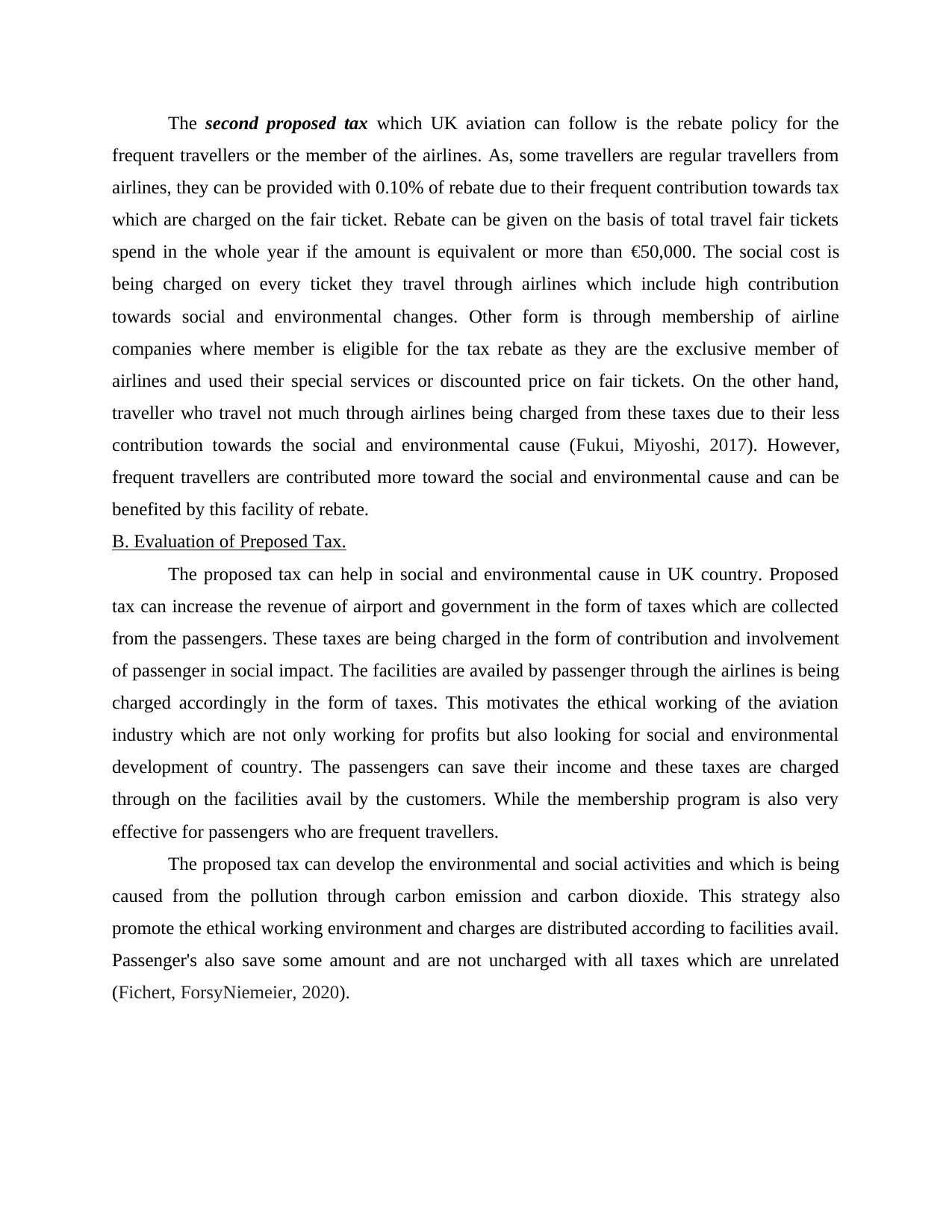
The second proposed tax which UK aviation can follow is the rebate policy for the
frequent travellers or the member of the airlines. As, some travellers are regular travellers from
airlines, they can be provided with 0.10% of rebate due to their frequent contribution towards tax
which are charged on the fair ticket. Rebate can be given on the basis of total travel fair tickets
spend in the whole year if the amount is equivalent or more than €50,000. The social cost is
being charged on every ticket they travel through airlines which include high contribution
towards social and environmental changes. Other form is through membership of airline
companies where member is eligible for the tax rebate as they are the exclusive member of
airlines and used their special services or discounted price on fair tickets. On the other hand,
traveller who travel not much through airlines being charged from these taxes due to their less
contribution towards the social and environmental cause (Fukui, Miyoshi, 2017). However,
frequent travellers are contributed more toward the social and environmental cause and can be
benefited by this facility of rebate.
B. Evaluation of Preposed Tax.
The proposed tax can help in social and environmental cause in UK country. Proposed
tax can increase the revenue of airport and government in the form of taxes which are collected
from the passengers. These taxes are being charged in the form of contribution and involvement
of passenger in social impact. The facilities are availed by passenger through the airlines is being
charged accordingly in the form of taxes. This motivates the ethical working of the aviation
industry which are not only working for profits but also looking for social and environmental
development of country. The passengers can save their income and these taxes are charged
through on the facilities avail by the customers. While the membership program is also very
effective for passengers who are frequent travellers.
The proposed tax can develop the environmental and social activities and which is being
caused from the pollution through carbon emission and carbon dioxide. This strategy also
promote the ethical working environment and charges are distributed according to facilities avail.
Passenger's also save some amount and are not uncharged with all taxes which are unrelated
(Fichert, ForsyNiemeier, 2020).
frequent travellers or the member of the airlines. As, some travellers are regular travellers from
airlines, they can be provided with 0.10% of rebate due to their frequent contribution towards tax
which are charged on the fair ticket. Rebate can be given on the basis of total travel fair tickets
spend in the whole year if the amount is equivalent or more than €50,000. The social cost is
being charged on every ticket they travel through airlines which include high contribution
towards social and environmental changes. Other form is through membership of airline
companies where member is eligible for the tax rebate as they are the exclusive member of
airlines and used their special services or discounted price on fair tickets. On the other hand,
traveller who travel not much through airlines being charged from these taxes due to their less
contribution towards the social and environmental cause (Fukui, Miyoshi, 2017). However,
frequent travellers are contributed more toward the social and environmental cause and can be
benefited by this facility of rebate.
B. Evaluation of Preposed Tax.
The proposed tax can help in social and environmental cause in UK country. Proposed
tax can increase the revenue of airport and government in the form of taxes which are collected
from the passengers. These taxes are being charged in the form of contribution and involvement
of passenger in social impact. The facilities are availed by passenger through the airlines is being
charged accordingly in the form of taxes. This motivates the ethical working of the aviation
industry which are not only working for profits but also looking for social and environmental
development of country. The passengers can save their income and these taxes are charged
through on the facilities avail by the customers. While the membership program is also very
effective for passengers who are frequent travellers.
The proposed tax can develop the environmental and social activities and which is being
caused from the pollution through carbon emission and carbon dioxide. This strategy also
promote the ethical working environment and charges are distributed according to facilities avail.
Passenger's also save some amount and are not uncharged with all taxes which are unrelated
(Fichert, ForsyNiemeier, 2020).
Paraphrase This Document
Need a fresh take? Get an instant paraphrase of this document with our AI Paraphraser
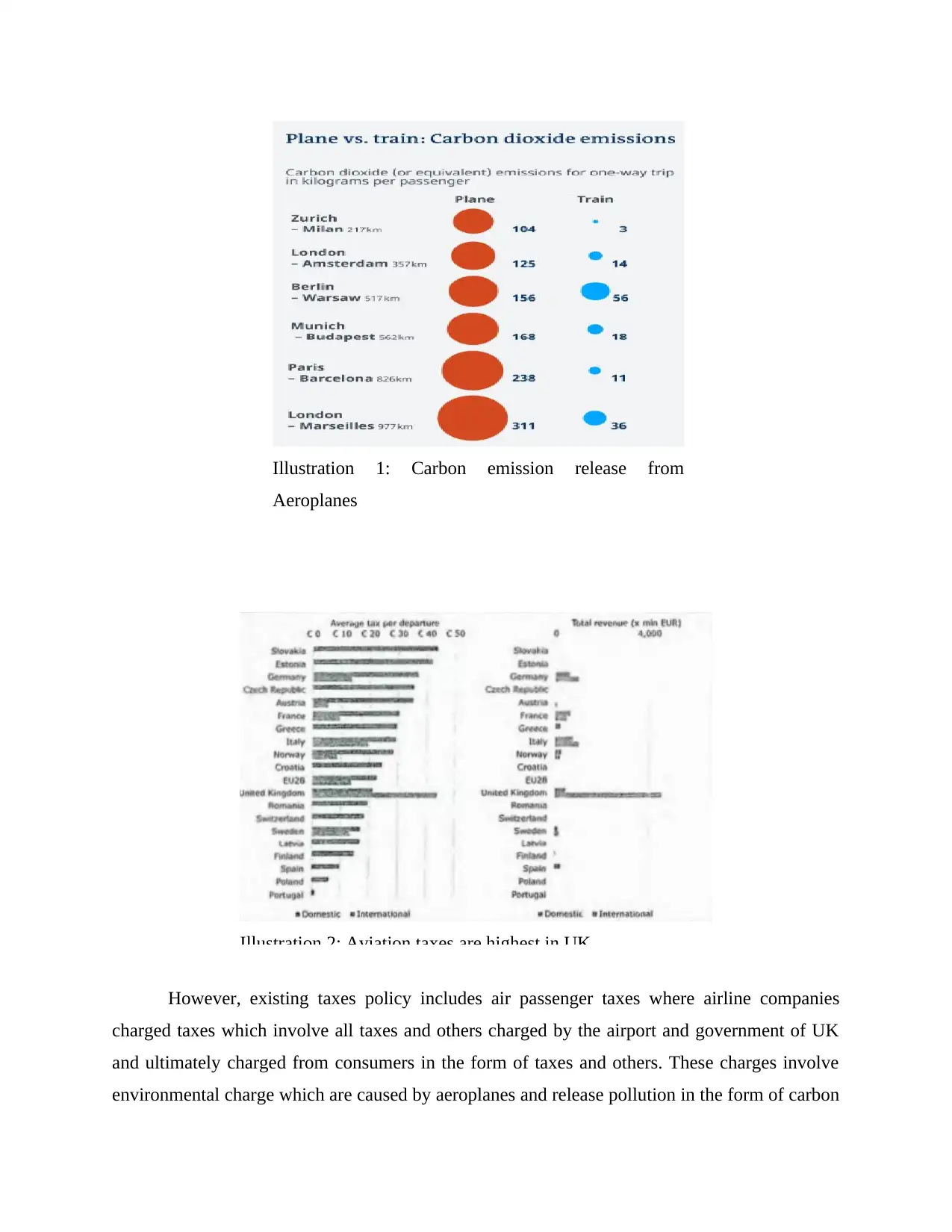
Illustration 1: Carbon emission release from
Aeroplanes
Illustration 2: Aviation taxes are highest in UK
However, existing taxes policy includes air passenger taxes where airline companies
charged taxes which involve all taxes and others charged by the airport and government of UK
and ultimately charged from consumers in the form of taxes and others. These charges involve
environmental charge which are caused by aeroplanes and release pollution in the form of carbon
Aeroplanes
Illustration 2: Aviation taxes are highest in UK
However, existing taxes policy includes air passenger taxes where airline companies
charged taxes which involve all taxes and others charged by the airport and government of UK
and ultimately charged from consumers in the form of taxes and others. These charges involve
environmental charge which are caused by aeroplanes and release pollution in the form of carbon
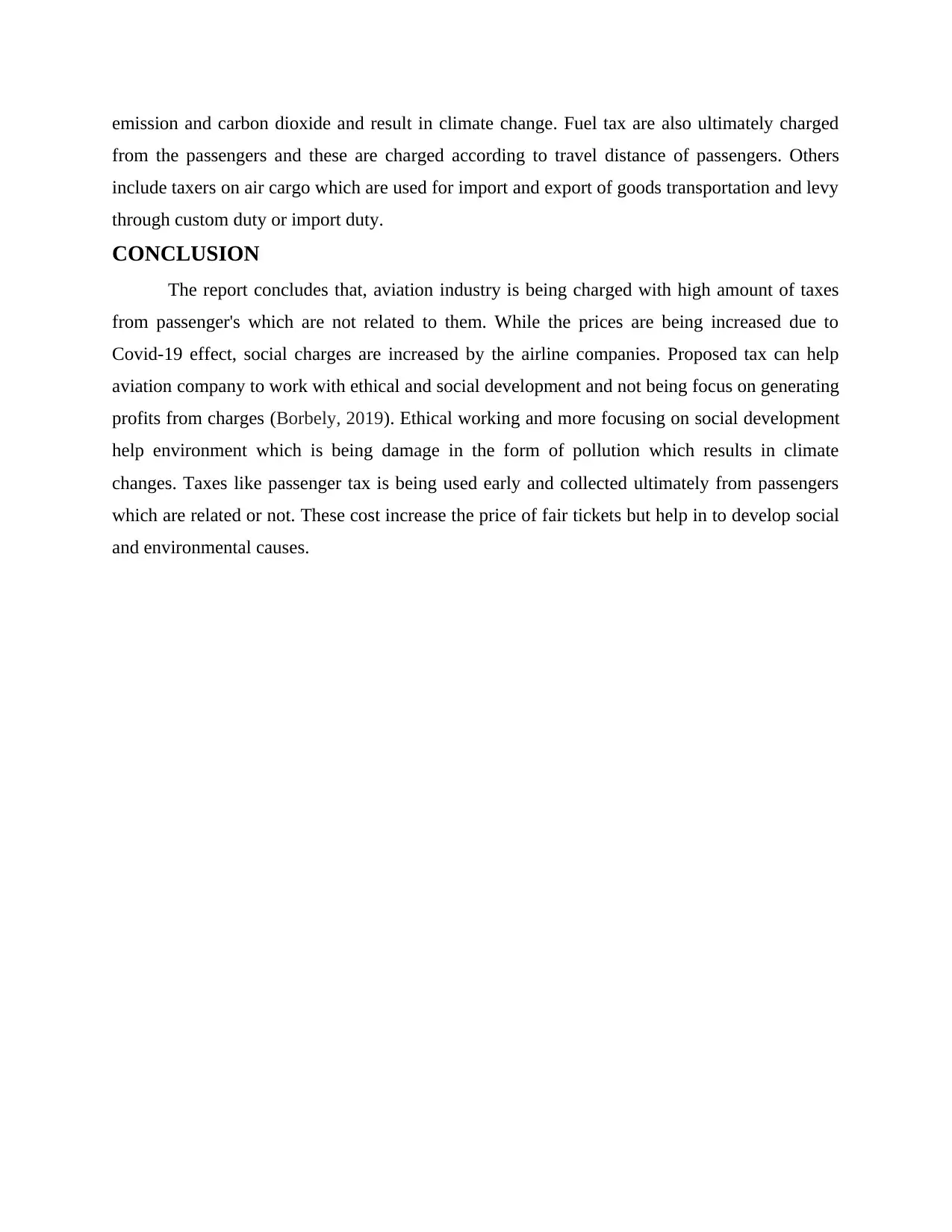
emission and carbon dioxide and result in climate change. Fuel tax are also ultimately charged
from the passengers and these are charged according to travel distance of passengers. Others
include taxers on air cargo which are used for import and export of goods transportation and levy
through custom duty or import duty.
CONCLUSION
The report concludes that, aviation industry is being charged with high amount of taxes
from passenger's which are not related to them. While the prices are being increased due to
Covid-19 effect, social charges are increased by the airline companies. Proposed tax can help
aviation company to work with ethical and social development and not being focus on generating
profits from charges (Borbely, 2019). Ethical working and more focusing on social development
help environment which is being damage in the form of pollution which results in climate
changes. Taxes like passenger tax is being used early and collected ultimately from passengers
which are related or not. These cost increase the price of fair tickets but help in to develop social
and environmental causes.
from the passengers and these are charged according to travel distance of passengers. Others
include taxers on air cargo which are used for import and export of goods transportation and levy
through custom duty or import duty.
CONCLUSION
The report concludes that, aviation industry is being charged with high amount of taxes
from passenger's which are not related to them. While the prices are being increased due to
Covid-19 effect, social charges are increased by the airline companies. Proposed tax can help
aviation company to work with ethical and social development and not being focus on generating
profits from charges (Borbely, 2019). Ethical working and more focusing on social development
help environment which is being damage in the form of pollution which results in climate
changes. Taxes like passenger tax is being used early and collected ultimately from passengers
which are related or not. These cost increase the price of fair tickets but help in to develop social
and environmental causes.
⊘ This is a preview!⊘
Do you want full access?
Subscribe today to unlock all pages.

Trusted by 1+ million students worldwide
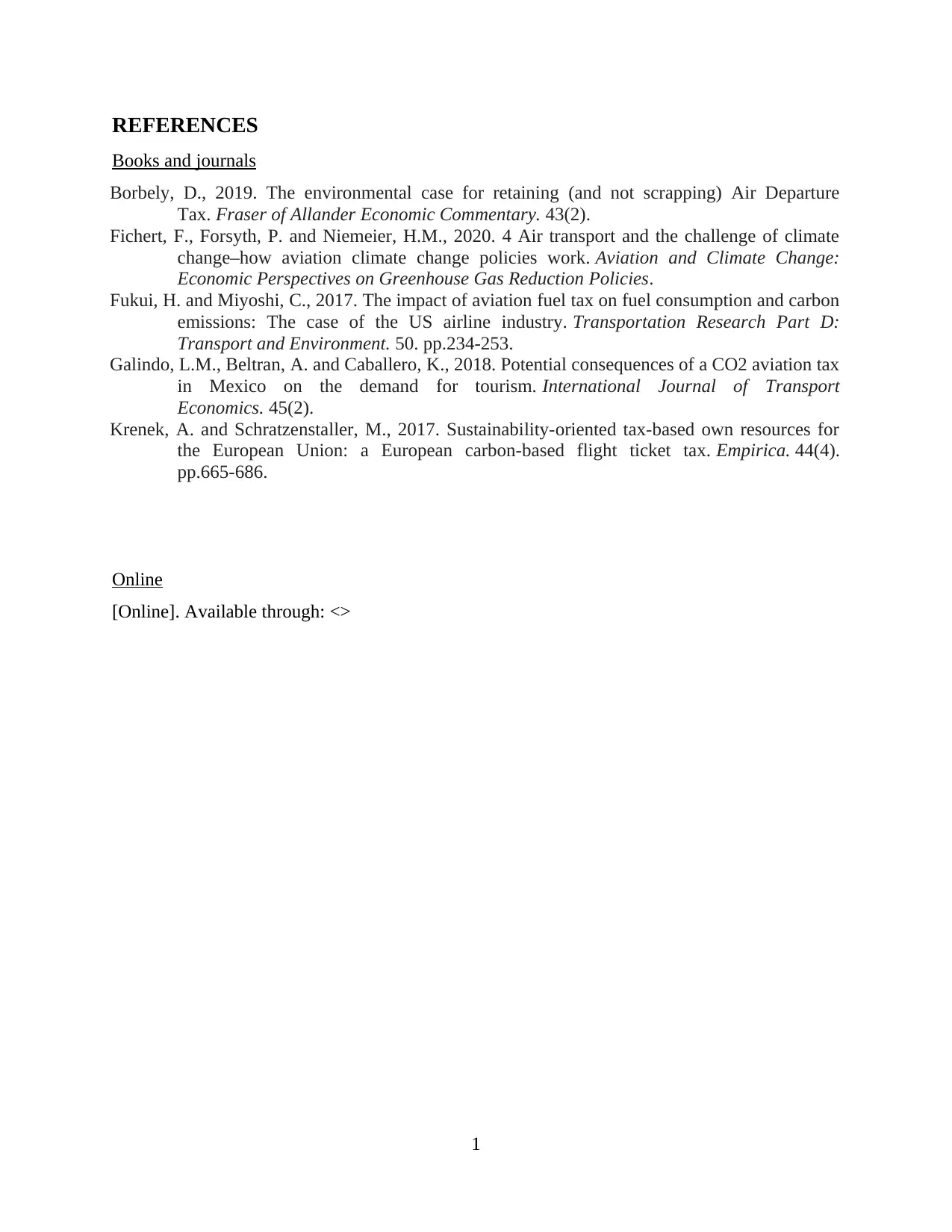
REFERENCES
Books and journals
Borbely, D., 2019. The environmental case for retaining (and not scrapping) Air Departure
Tax. Fraser of Allander Economic Commentary. 43(2).
Fichert, F., Forsyth, P. and Niemeier, H.M., 2020. 4 Air transport and the challenge of climate
change–how aviation climate change policies work. Aviation and Climate Change:
Economic Perspectives on Greenhouse Gas Reduction Policies.
Fukui, H. and Miyoshi, C., 2017. The impact of aviation fuel tax on fuel consumption and carbon
emissions: The case of the US airline industry. Transportation Research Part D:
Transport and Environment. 50. pp.234-253.
Galindo, L.M., Beltran, A. and Caballero, K., 2018. Potential consequences of a CO2 aviation tax
in Mexico on the demand for tourism. International Journal of Transport
Economics. 45(2).
Krenek, A. and Schratzenstaller, M., 2017. Sustainability-oriented tax-based own resources for
the European Union: a European carbon-based flight ticket tax. Empirica. 44(4).
pp.665-686.
Online
[Online]. Available through: <>
1
Books and journals
Borbely, D., 2019. The environmental case for retaining (and not scrapping) Air Departure
Tax. Fraser of Allander Economic Commentary. 43(2).
Fichert, F., Forsyth, P. and Niemeier, H.M., 2020. 4 Air transport and the challenge of climate
change–how aviation climate change policies work. Aviation and Climate Change:
Economic Perspectives on Greenhouse Gas Reduction Policies.
Fukui, H. and Miyoshi, C., 2017. The impact of aviation fuel tax on fuel consumption and carbon
emissions: The case of the US airline industry. Transportation Research Part D:
Transport and Environment. 50. pp.234-253.
Galindo, L.M., Beltran, A. and Caballero, K., 2018. Potential consequences of a CO2 aviation tax
in Mexico on the demand for tourism. International Journal of Transport
Economics. 45(2).
Krenek, A. and Schratzenstaller, M., 2017. Sustainability-oriented tax-based own resources for
the European Union: a European carbon-based flight ticket tax. Empirica. 44(4).
pp.665-686.
Online
[Online]. Available through: <>
1
Paraphrase This Document
Need a fresh take? Get an instant paraphrase of this document with our AI Paraphraser

2
1 out of 8
Related Documents
Your All-in-One AI-Powered Toolkit for Academic Success.
+13062052269
info@desklib.com
Available 24*7 on WhatsApp / Email
![[object Object]](/_next/static/media/star-bottom.7253800d.svg)
Unlock your academic potential
Copyright © 2020–2026 A2Z Services. All Rights Reserved. Developed and managed by ZUCOL.





